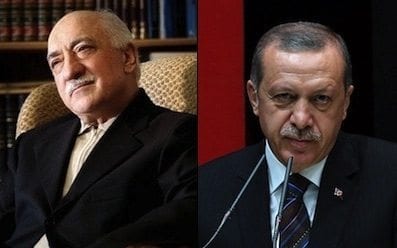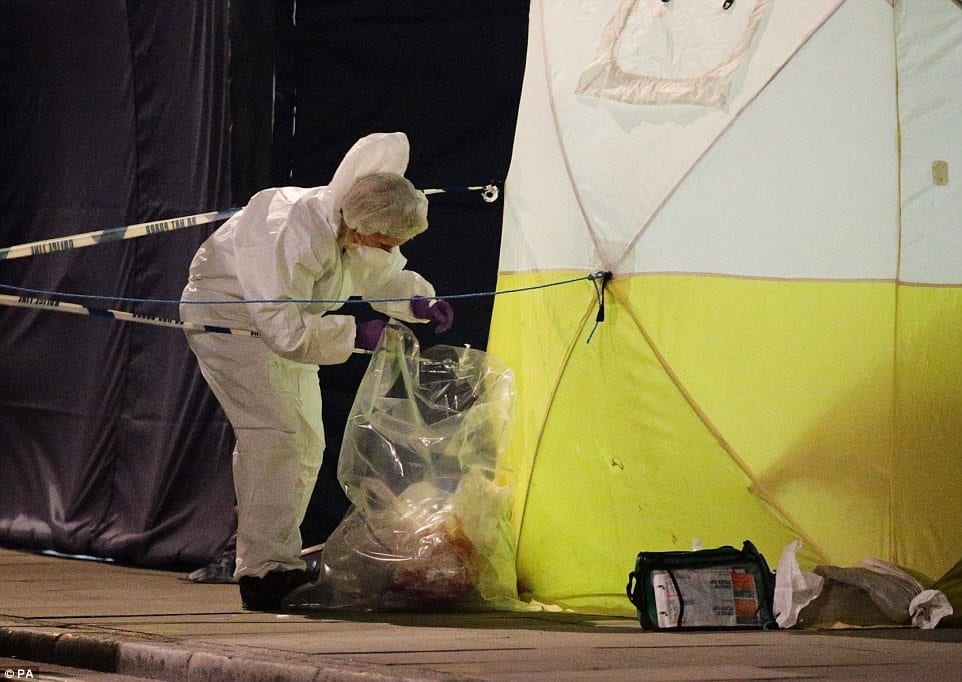 ‘I heard a scream, then I saw the blood’: Woman in her 60s is killed and five people are injured as man, 19, ‘goes on rampage in a terrorist knife attack’ in Russell Square where 7/7 bomb was detonated
‘I heard a scream, then I saw the blood’: Woman in her 60s is killed and five people are injured as man, 19, ‘goes on rampage in a terrorist knife attack’ in Russell Square where 7/7 bomb was detonated
- Woman in her 60s has died and five others injured after knifeman, 19, ‘went on the rampage’ in London
- Police called to Russell Square at 10.30pm last night after witnesses say screaming victims tried to flee
- One witness said: ‘There was a madman running around with a knife just lunging at people randomly and stabbing them. He was just going for anyone he could see’
- Suspect Tasered and spent night in hospital before being taken to a South London police station for questioning
- Five other victims were knifed in the back, side and arms. Two are in hospital and three were discharged
- Scotland Yard said incident could be terror related and said knifeman has ‘significant mental health issues’
According to Daily Mail a knifeman has gone on the rampage in central London and murdered a woman in her 60s and injured five more people in a possible terror attack.
Police were called to Russell Square at 10.30pm last night after the suspect, 19, chased and stabbed pedestrians in the back, side and arms who were left ‘screaming and covered in blood’ on the pavement.
He was arrested on suspicion of murder after armed officers Tasered him to the ground and after a night in hospital has been taken into custody at a south London police station.
A woman was pronounced dead at the scene and two women and three men were taken to hospital. Three have since been discharged.
The killer’s knife was abandoned on the pavement next to the body of the unnamed victim, which remained under a forensics tent overnight and was taken away by ambulance this morning.
Hotel staff on Russell Square, an area always packed with tourists, said the attacker was completely silent was ‘just going for anyone he could see’ before he was shot with a Taser and pinned face-down by police.
One worker told the Standard: ‘The police came to the hotel and a guest was telling them what he saw. He said there was a madman running around with a knife just lunging at people randomly and stabbing them’.
Scotland Yard’s top anti-terror officer Mark Rowley gave a press conference outside Scotland Yard at 3.40am and said the 19-year-old appears to have ‘significant mental health issues’ but admitted terrorism could be a motive.
The Met will send scores of armed officers on to the streets of the London this morning – including members of its new elite counter-terror unit – to reassure the public and in case there is a new attack.
- A 19-year-old man has been arrested on suspicion of murder after he stabbed six people in Russell Square at around 10.30pm last night. One witness called him ‘dark-skinned’ or African, another white and ‘chubby’
- A woman, believed to have been in her 60s, was fatally injured and five others were treated in hospital. Three were discharged this morning.
- Spanish family of four – believed to be on holiday in London – cradled the woman as she died on the pavement
- Witnesses say he was chasing screaming victims and slashing ‘anyone he could see’ before he was Tasered by police.
- Counter-terrorism officers are supporting the homicide investigation into the incident, while Met has said early indications suggest man’s mental health ‘was a factor’. Terrorism is a motive being considered.
- Scotland Yard has sent out armed units to patrol the streets as London Mayor Sadiq Khan urged the public to remain ‘calm and vigilant’.
The attacker has struck at the heart of London’s tourist centre, packed with hotels. At 10.30pm, when he stabbed his victims, the area was full of people who had enjoyed a night in the West End.
One witness claimed he may have jumped off a moped before slashing at his victims.
A source said the suspect was seen to go ‘on the rampage’ with the weapon. Another witness said he heard one of the victim’s scream before running over to help them.
Fernando, 40, from Brazil told MailOnline how he cycled into the horrific scene his way home last night and saw the murder victim slumped against the fence of Russell Square’s famous gardens and called the emergency services.
He said: ‘I was cycling home from work and some people stopped me in the street asking for help to call an ambulance. I saw an old lady lying against the wall – she had collapsed. I had to call 999, but it took a bit of time because I didn’t know the postcode, then two or three minutes later a car full of police turned up. That was the moment I realised she had not just collapsed but had been stabbed.’
According to Fernando, a Spanish family of four – a mother, father and their two daughters thought to be in their 20s – were looking after the woman who is believed to have died at the scene.
‘She was being cradled in the lap of a Spanish tourist who was trying to keep her alive. I didn’t hear the old woman speak – she had been stabbed in the back,’ he said.
According to witnesses, the scale of the attack was initially unclear as Fernando said at first he had no idea that other people had been injured.
‘I don’t know if she was alive when I left – I think she had already died – she wasn’t talking. The Spanish girl tried to talk to her and keep her alive. She said to me before I left that she was still breathing.
‘I realised it was a stabbing when they started giving her first aid. Then I realised more people had been stabbed.’
Witnesses said the attacker was chubby, had been wearing black shorts and a white t-shirt and that he left with the knife, which he carried in his right hand.
‘I understood he was white and a bit shabby – but they couldn’t see much of his face,’ he said.
Fernando was told that the attacker had been hiding his face with his forearm as he ran along stabbing people in the back.
‘He did not shout anything,’ he said, adding that people didn’t shout either – terrified that the attack was not over.
A night receptionist at the Repton Hotel, overlooking the scene, said: ‘I saw a woman lying on the floor with police standing over her, checking to see if she was alive.
‘She looked unconscious, they were shaking her but she was lying still. Then the ambulance arrived. A guest came in shortly afterwards saying she saw police chasing a man down the street.’
Police cordoned off the area and additional police patrols are in place in London, and police helicopters hovered over the city well into the early hours.
The incident occurred in the same area as where one of the 7/7 bombs detonated in 2005. A total of 26 people were killed when Germaine Lindsay, 19, detonated a suicide bomb on a Piccadilly line Tube as it moved between King’s Cross station and Russell Square.
On the same day a bus was destroyed on Tavistock Square, which is just up the street.
Last night’s incident came hours after the Met unveiled its brand new elite anti-terror unit.
Scotland Yard confirmed that ‘terrorism is one possibility being explored at this stage’ and also said that early indications suggest that ‘mental health is a significant factor in this case’.
The Met’s Assistant Commissioner for special operations, Mark Rowley, said it had been a ‘tragic incident’.
He said: ‘Early indications suggest that mental health is a significant factor in this case and that is one major line of inquiry.
‘But of course at this stage we should keep an open mind regarding motive and, consequently, terrorism as a motivation remains but one line of inquiry for us to explore,’ he said.
‘Armed officers arrived at the scene within five minutes, they discharged the Taser whilst confronting and arresting the suspect.
‘Six people have been injured, including the one woman who sadly died at the scene, and the others have received various injuries.’
He confirmed murder detectives and the counter-terrorism unit had been brought in to investigate the killing.
Mayor of London Sadiq Khan has called for the public to remain ‘calm and vigilant’ as police investigate whether a knife attack that left one woman dead and five people injured was terror-related.
Mr Khan said his ‘heart goes out to the victims of the incident in Russell Square and their loved ones’ after the death of the woman, who may be a Spanish tourist.
Eyewitness Zuhair Awartani told the BBC he saw the attacker being arrested.
He said: ‘I arrived here at my hotel and I saw the guy getting arrested just on the block. There were two police cars and he was like African – a dark-skinned man’.
Helen Edwards passed by as police arrested the man and said she believed that someone else may also have been attacked in a side road.
There are fears that the knifeman operated with an accomplice as the Met refused to rule out arresting more suspects. One witness said he saw ‘a man flee on a motorbike’. Others suggested a gang may have been involved.
Philippa Baglee, who was in London to celebrate her 60th birthday, was walking past Russell Square when she saw a group of people looking down at the ground.
She said: ‘There was someone lying on the ground and lots of people around and a guy with a black motorcycle helmet balanced on top of his head walking around.
‘He was on the outside of everyone looking on the ground.
‘The moment I saw an ambulance and police car arrive, I thought someone had just been knocked off their bike.’
Asked to describe the man, she said he was short and dressed in what she thought was all black leathers.
She continued: ‘It was all very calm. No-one was panicking. I just went back in.’
Ms Baglee added that she did not find out what had happened until Thursday morning.
‘It’s a bit scary, I have just come for a couple of nights for my 60th.’
An eyewitness, who called himself Michael, told MailOnline that he saw a woman – aged around 25 – with blood pouring from her back. He said another woman of the same age was suffering a wounded arm.
He said he believed the victims were heard speaking in Spanish.
He said: ‘I heard a scream, and then we went to the park and I saw a girl lying on the floor with blood coming from her back. Another girl had blood on her arm.’
The two women were with two men who were shouting ‘tío lo vi todo’ in Spanish, meaning ‘I saw everything’.
The witness added: ‘They all spoke Spanish so I guess they were a group. I only saw the victim and the girl with the arm stabbed from that group.
‘I just saw blood just next to her. She was lying on the floor with a friend hugging her.’
Another witness, Jeremy Cheng, said: ‘A woman with whom I spoke said that police told her that a gang of some sort was involved – and that they fled south or south-west.
‘But that is just speculation.’
Robbie Deegan, 22, said: ‘I saw people running and screaming when we came over here to see what the hustle and bustle was about. We heard a commotion and saw people running away from the square.’
Paul Hutchinson, a taxi driver, said he passed the incident shortly after it occurred.
He said: ‘I drove past Russell Square and the road wasn’t shut but the pavement was all taped off by police, lots of armed police, lots of cars and the body was just lying on the floor. You could see the boots sticking out from under the cloth.
‘Loads of armed police, cars with lights on and the body on the floor.’
Pol O’Geibheannigh, 45, was walking back from the cinema when he saw a massive police presence and a woman lying in a pool of blood.
He said: ‘I just knew right away that this is not right. You just don’t see armed police around this area.
‘This was just wall to wall with armed police. You could see a woman on the floor. There was dark matter around her, which was obviously blood.
‘She was lying in a pool of blood with a red blanket on top of her. I went into the bar and it wasn’t until an hour later that they put the tent up.
‘And then at about 12.30, when we were coming out, there were about five or six people running off towards Bedford Square.
‘That level of police presence I haven’t seen since 7/7 and I was here – I live around the corner.
‘But it was just a matter of someone being in the wrong place at the wrong time.’
A 35-year-old man, who did not wish to be named, said he saw three men fleeing nearby Queen Square shortly after the incident. ‘One man fled on a motorcycle heading down a pedestrianised area,’ he said. ‘He obviously looked in a hurry.’
Meanwhile, a guest at the Imperial Hotel said he saw a man lying on the ground. He told MailOnline: ‘There was all sorts of commotion going on’.
He added that guests at the hotel have been asked to enter through the rear entrance as the front is cordoned off by police.
Local resident Helen Edwards, 31, said the panic reminded her of the 7/7 attacks. She was woken by the bus bomb at Tavistock Square on July 7, 2005.
Talking about last night’s incident, she said: ‘It was a bit surreal. It brings back memories of 7/7. I was woken by the bus bomb that day.
‘I was walking near Russell Square tonight when I saw several armed police officers and armed response units. I walked around the cordon and saw an ambulance and loads of people.’
Other witnesses took to Twitter to share news of the attack. Abdulrahman Muammar wrote: ‘#London Russell Square locked down & surrounded with police officers. Many police cars & ambulances.’
Helen Edwards tweeted: ‘#Police guarding cordon around #russellsquare #bedfordplace #southamptonrow. Saw armed police & paramedics earlier. I saw armed police guarding the cordon around Russell Square plus ambulance at another end of Bedford place.’
Meanwhile, Lauren Brittny said: ‘Sadly my brother and his mates witnessed the stabbing in Russell Square. And the police obviously arrived too late. My brother rang me at the time as he was in shock. But all he said was the man quickly jogged passed him.
‘My brother was at UCL summer camp and they were returning from a theatre trip . His mentors were guarding them so he was unable to do much I wish he filmed the guy. But everyone was stunned by the situation.
‘My brother said the woman was surrounded by her friend he suspected they were on a Hen night.’
Scotland Yard confirmed the incident is being treated as a possible terror offence.
The Met said one suspect was detained after being Tasered at the scene of the incident – opposite the three-star Imperial Hotel and near a quiet park.
A spokesman said: ‘Police were called at 10.33pm to reports of a man seen in possession of a knife injuring people at Russell Square, WC1.
‘Officers attended the scene along with the London Ambulance Service.
‘Up to six people were found injured at the location.
‘A female was treated at the scene but was pronounced dead a short time later.
‘We await an update on the condition of the other persons injured and details of any other injuries.’
Police added that the man was arrested at the scene six minutes after the incident.
The spokesman added: ‘A man was arrested at 10.39pm and a Taser was discharged by one of the arresting officers.
‘Terrorism is one possibility being explored at this stage.’
Additional police units have been deployed to the area to provide reassurance. Extra patrols will also be carried out in the area near the British Museum in Bloomsbury.
Anyone with information should contact police on 101 or call Crimestoppers anonymously on 0800 555 111.
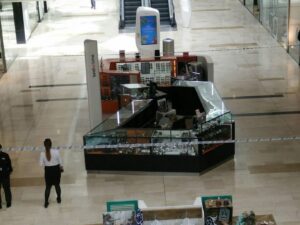 Westfield London stabbing: Man in hospital after shopping centre attack
Westfield London stabbing: Man in hospital after shopping centre attack
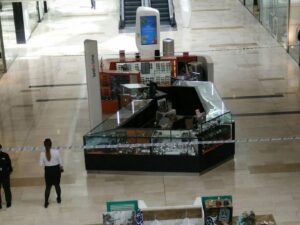
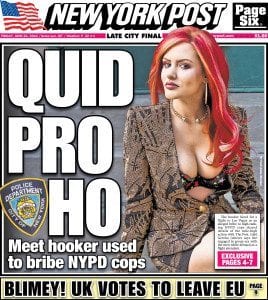




 A Washington, DC transit police officer was arrested on Wednesday on charges he attempted to provide material support to the Islamic State (IS) group, the US Justice Department said, in the first such case involving a member of law enforcement.
A Washington, DC transit police officer was arrested on Wednesday on charges he attempted to provide material support to the Islamic State (IS) group, the US Justice Department said, in the first such case involving a member of law enforcement.

